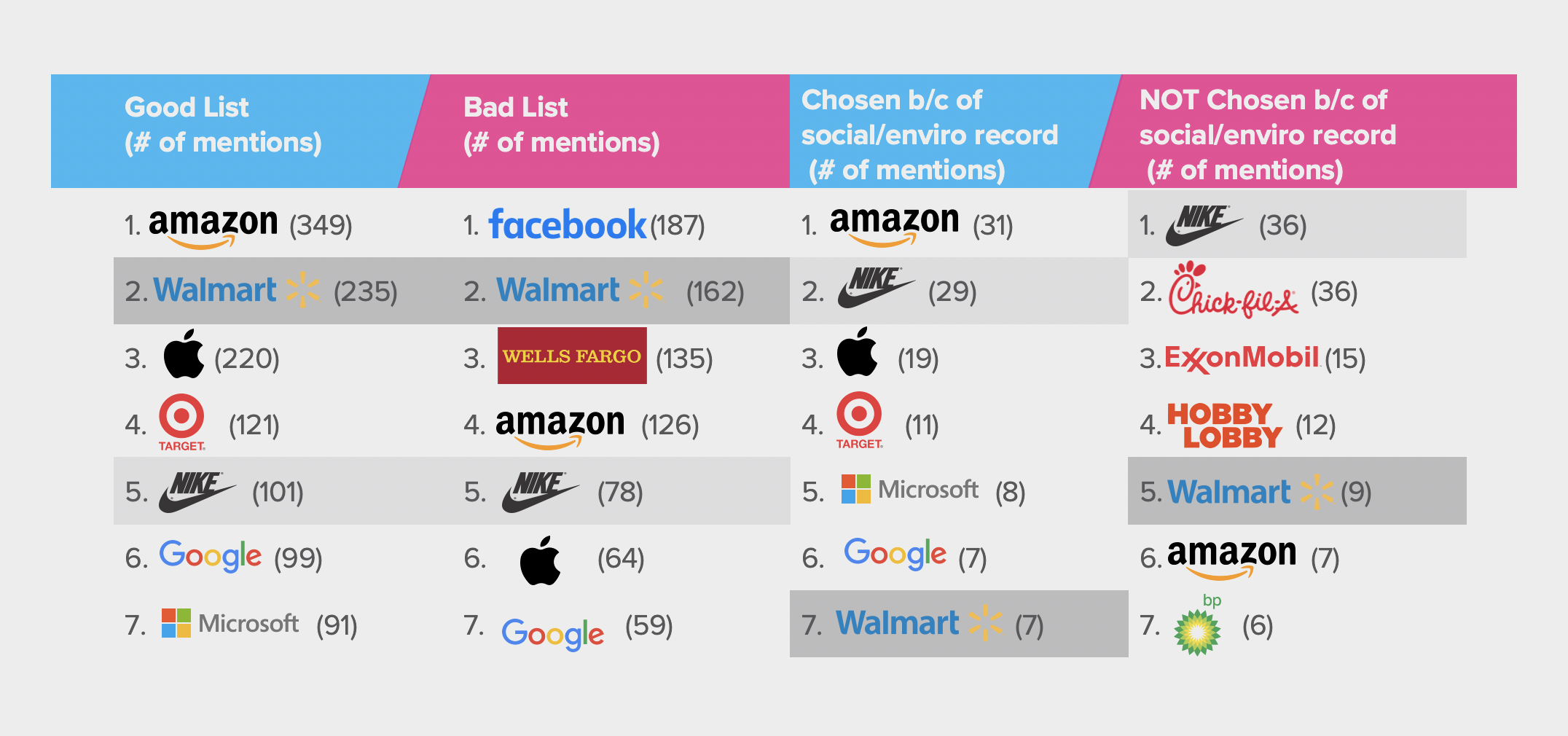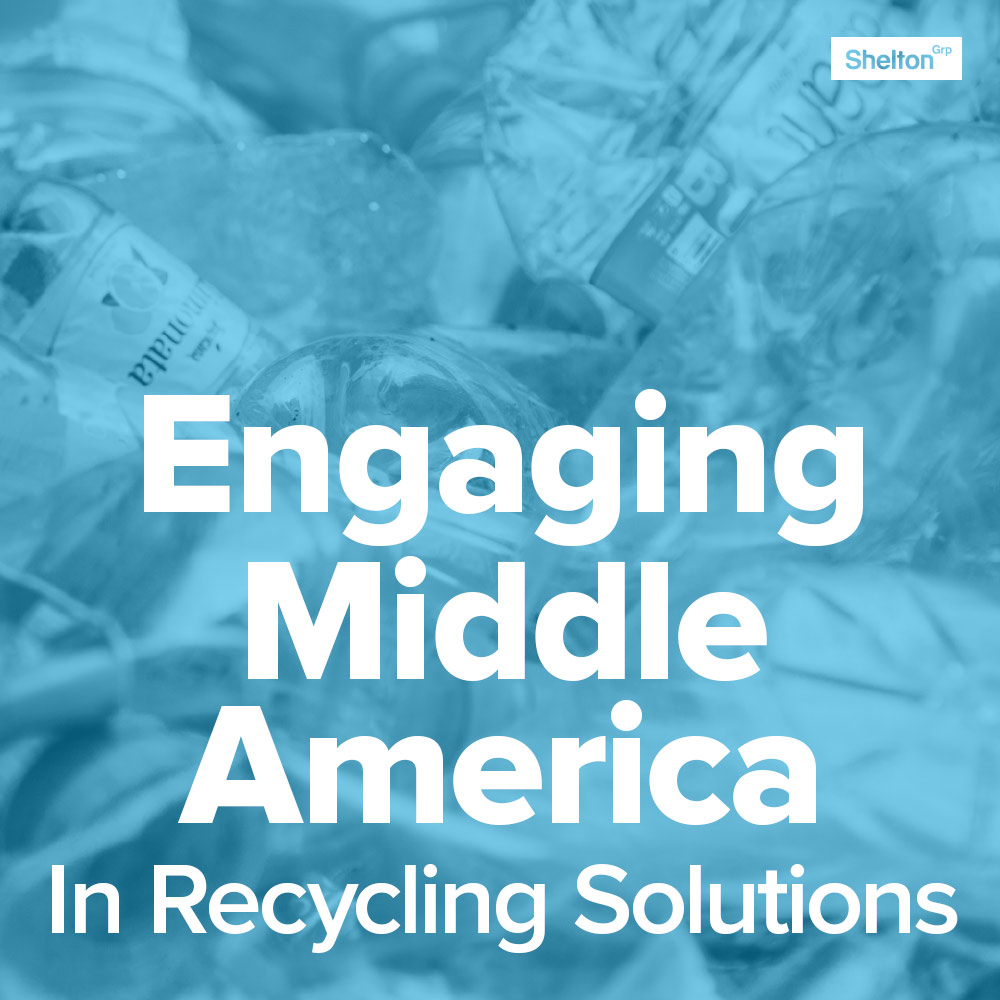Should your brand really take a stand?
Shelton Stat of the Week
19% of Americans have chosen a brand because of the environmental or social record of the manufacturer. 18% have stopped purchasing a brand for the same reason. — Good Company, December 2020-January 2021
We have a new report coming out next week called Good Company, so be on the lookout. One of the more fascinating charts in the report is this one:

Working from left to right, these are the open-ended, unaided responses from participants to the following questions:
- Name three companies or brands you consider to be good. It’s up to you to decide what “good” is.
- Name three companies or brands you consider to be bad. It’s up to you to decide what “bad” is.
- Have you ever chosen one brand or product over another based on the social or environmental record of its manufacturer? Please tell us what brand/product you’ve chosen to purchase because of the social or environmental record of its manufacturer.
- Have you ever stopped purchasing a brand or product based on the social or environmental record of its manufacturer? Please tell us what brand/product you’ve stopped purchasing because of the social or environmental record of its manufacturer.
This chart reveals that your company or brand can be judged as “bad” but not necessarily be boycotted.
- Facebook earned the top spot on the Bad List, with 187 votes, but they only got four mentions for the “Stopped buying because of their environmental or social record” list. In this case, what Facebook is judged for as bad (i.e., “promoting misinformation, not correcting lies, not responsible with content, censorship, too much power”) isn’t seen as a “social record.”
On the flip side, some of the brands that were boycotted because of their environmental or social record didn’t make it as high/weren’t as top of mind in the open-ended answers for the “Bad Company” list.
- Chick-fil-A is #2 on the list of companies boycotted, but number 11 on the “Bad Company” list.
- ExxonMobil is #3 on the list of companies boycotted, but number 14 on the “Bad Company” list.
- Hobby Lobby is #4 on the list of companies boycotted, but number 22 on the “Bad Company” list.
What I find most fascinating – and worth exploring for brands – is the story behind both Walmart and Nike, which I touched on in this post. Today, I want to dig into Nike, which is #5 on both the Good and Bad Company lists, #2 on the list of brands chosen because of their stand and #1 on list of brands boycotted because of their stand, because this is a great example of a brand that took a calculated risk with a bold stand and it paid off. It paid off because Nike deeply understands their target audience. This would NOT have worked for many, many brands.
Unless you were living on an island with no cell coverage in 2018, you know that Nike featured Colin Kaepernick in its ad campaign after his 2016 release from the NFL following his kneeling protest during the national anthem. Immediately following the campaign, sales jumped 10% for Nike, prompting commentary like this: “It looks like a real rebuke for folks who said, ‘We’ll boycott Nike,'” University of Michigan Business School professor Jerry Davis told ABC News. “It turns out Democrats buy a lot more sneakers than Republicans. The demo that is willing to spend $200 on Nike sneakers is not the demo that’s going to boycott them because of Kaepernick.”
In 2020, Nike was still reaping the benefits of the campaign in both brand reputation and sales numbers, despite continued criticism from some camps.
- June 2020: “In 2018, Harris found 21 percent of respondents vowed to boycott Nike products after the marketing campaign was released, which is down to 14 percent in the most recent poll. Nike’s overall reputation got a 54 percent positive opinion, up six points from 2018.”
- July 2020: “Since Nike’s new deal with Kaepernick, the sportswear company’s value is reportedly up $26.2 billion.”
Again, this was a fantastic, calculated move from Nike. But this type of controversial risk wouldn’t be right for every brand. You have to think carefully about what message fits your market and your target consumer.
Want to learn more about what kinds of commitments you should be making and following through on to be considered a Good Company and/or drive purchases? Download our report next week or, as always, give us a shout and we’ll help you craft the stand that’s right for your brand.

How and when CEOs should address hot-button political and social issues
— Forbes
The increased polarization of the country and the tribal nature of politics has created fresh concerns about the consequences for businesses that speak up (or don’t) on social issues. Neeru Paharia is an associate professor at Georgetown University’s McDonough School of Business and an expert on consumer behavior and signaling through brands. She acknowledged that taking a political stance can be complicated for brands. “It depends on who your target consumers are — do they agree with this position? Have other companies taken positions on similar issues?”

Analysis: Millennials and global consumers push U.S. companies to get political
— Reuters, Business News
A push to attract young and diverse talent and global consumers is behind some of corporate America’s willingness to speak out on politically charged issues like Georgia’s new voting law. The new law drew condemnation from many U.S. companies this week, including Microsoft Corp and Citigroup. A number of companies say it disenfranchises some voters. Delta CEO Ed Bastian said in a public memo that his decision to speak out was informed by discussions with leaders and employees in the Black community. Read more…
Engaging Middle America In Recycling Solutions
Before COVID-19, 41% of Americans wanted to be seen as someone who buys green products, and many could cite an example of a brand they’d purchased (or not purchased) because of the environmental record of the manufacturer. Now, in the middle of the pandemic, the numbers have dropped dramatically. The big question is, what does this mean for engaging Americans in their number one green activity: recycling? Another question is, what does it mean for companies’ sustainability brand?
Our latest report answers these questions by digging into current consumer attitudes, how they impact consumer behavior, and how organizations should respond to ensure recycling – and other green behaviors – keep happening.


-
TAGS:Corporate Sustainability